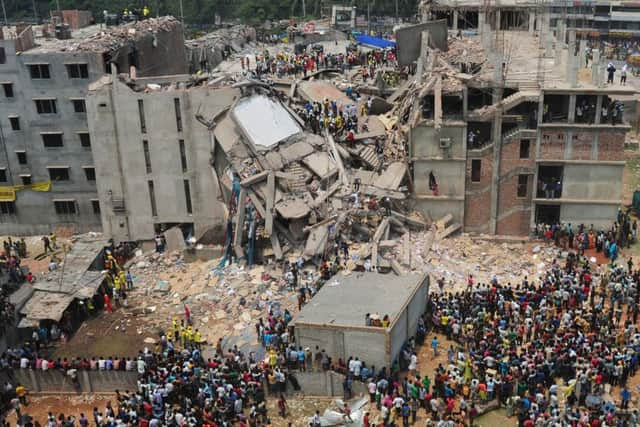Murder charges over Bangladesh factory collapse


The charges were filed against 41 people, including the building’s owner, Sohel Rana, and his parents and more than a dozen government officials, for their direct role in the deaths of 1,137 people in the collapse of Rana Plaza, said the lead investigator, Bijoy Krishna Kar of the criminal investigation department.
Investigators initially had said the accused, who also include the owners of the five factories that the building housed, would be charged with culpable homicide, but they later changed their plans due to the gravity of the accident, Bangladesh’s worst industrial disaster.
Advertisement
Hide AdAdvertisement
Hide AdIf convicted of murder, the defendants could face the death penalty. The maximum punishment for culpable homicide is seven years in jail.
Investigators said the shift came after the investigation found that Rana, his staff and the management of the five factories had forced the workers to enter the building despite their unwillingness to work on the day of the accident after the building developed major cracks a day earlier.
The police report called the deaths a “mass killing”. About 2,500 people were injured in the disaster.
Mr Kar, who submitted the charges to a court in Dhaka, Bangladesh’s capital, said a hearing would take place 28 June to decide on further proceedings.
“We pressed charges against 42 people, including owner Sohel Rana, in two cases filed over the building collapse,” he said.
Mr Rana was arrested days after the disaster as he attempted to flee to India.
In a separate case, the accused will also face charges of violating safety rules in building Rana Plaza because additional floors were added to the original five-story building, which was basically meant for office and shopping malls. Later, illegally built upper floors were transformed into factories.
The April 2013 collapse of Rana Plaza, located just outside Dhaka, highlighted grim conditions in Bangladesh’s garment industry. Extremely low wages in the poor south Asian country have led global brands and retailers to prefer Bangladesh to China and other developing countries.
Advertisement
Hide AdAdvertisement
Hide AdThe disaster drew attention to the poor working conditions in Bangladesh’s garment industry, one of the world’s largest. Bangladeshi factories provide cheap clothing for major Western retailers, which benefit from the country’s widespread low-cost labour.
One of these, New Wave Bottoms, supplied, owned by Associated British Foods, which said after the tragedy that it was working to meet the immediate needs of victims, such as offering emergency food aid.
“Primark will also pay compensation to the victims of this disaster who worked for its supplier,” the company said. “This will include the provision of long-term aid for children who have lost parents, financial aid for those injured and payments to the families of the deceased.”
The disaster has focused international attention on safety conditions in Bangladesh’s garment industry. Primark, thought to be the first retailer to promise compensation, noted that the building housed suppliers to other retail firms and urged them to follow suit.
Ruth Tanner, campaigns and policy director at the anti-poverty charity War on Want, said: “While Primark has taken some responsibility, the retailer and the other companies involved must pay full compensation, including loss of earnings, sign the Bangladesh Fire and Safety Agreement and ensure such a disaster never happens again.”